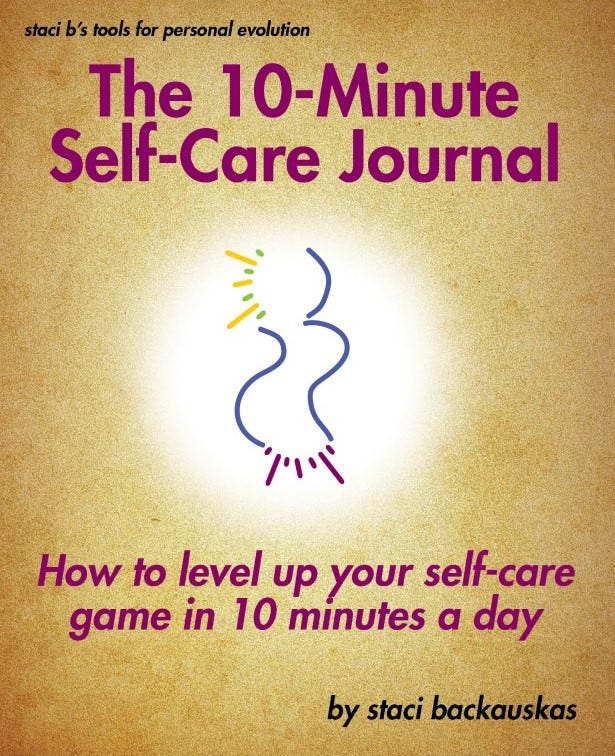Nervous System: Before and After
Chapter 2
TW: trauma, childhood trauma. If this topic presents a challenge for you, perhaps this piece isn’t for you.
Last month I began a series showing exactly how focusing on nervous system regulation has affected my behavior. Often called trauma responses, I prefer to say that an experience “reactivated something in my nervous system” because to me, the former expression has lost its power from overuse.
If you didn’t read the first piece, you can find it here on Substack, and I would encourage you to take a glance to get a thorough understanding of what I’m doing and why.
Learning about how the nervous system works has been a double-edged sword. On the one hand, it has led me to create a practice that enables me to still experience whatever is being reactivated in my body without the sometimes toxic behavior that used to accompany it and without the shame that often accompanied it. On the other, it shows me constantly how much is left to do.
To help me recognize and celebrate the progress, I offer two perspectives: how I would have (and sometimes did) handle an experience before this work and how I manage it now.
Backstory:
I have been asked by a colleague, Rose, to discuss my book The 10-Minute Self-Care Journal in a journaling group she runs for caregivers. I am over the moon. As a caregiver myself, I believe in and practice the system I developed to level up self-care and am thrilled to share what I’ve learned.
The Zoom begins and I slowly realize that the six people participating live in a retirement community together. “So you know,” Rose says to me, “everyone here has lost someone in the last eighteen months.”
She has chosen not to mute everyone, and in fact, has asked one person who self-muted to unmute. “I like it when we can all talk,” she says. The background noise ebbs and flows. Everyone is female except for one Zoom square with a couple. Although the woman is in the center of the screen, the man to her left, Robert, keeps leaning over and talking to her while I’m speaking.
I discuss some of the tools in my book and the experiences that led to their creation. There is chatter while I talk. I do a few of the exercises with them and get a positive response. Out of the blue, Robert asks me, “Have you ever heard of no-neck syndrome?” I am caught completely off guard.
“No,” I respond.
“It’s when you’re so stressed that your shoulders are at ear level and it looks like you have no neck,” he explains. Then he talks about how the only way to reduce stress is to turn your life over to Jesus. “You’ve got to stand in front of the mirror every day and thank God that you’re alive. Without Jesus, you’re nothing.” My entire trajectory is derailed as the others agree with him. Side conversations break out.
Rose does not address any of this but sends me a private chat telling me the man has some neurological issues.
Before:
I am bothered tremendously by the background chatter. How could the Rose not mute everyone? I complain to myself silently but smile and push through. I am annoyed and fight myself not to say anything. I ignore the irritation on my face reflected to me from the Zoom. Frankly, I don’t really care at this point.
When I discover everyone present is dealing with the loss of a loved one, I feel deceived. This is really a grief group, not a journaling group. How could she have not told me this beforehand? My mind is running in different directions. Do I pivot and adjust my plan to address that or just push on? I struggle to focus.
Later, when Robert asks me if I’ve heard of “no-neck syndrome” I freeze. I’ve been self-conscious for a long time about the stumpiness of my own neck, the result of years of unexplored stress. I feel very defensive. The tips of my ears burn. Who is this asshole?
He won’t shut up, going on and on about how unhealthy it is and the dangers of not addressing it. No one is stopping him. I feel attacked and go somewhere else in my mind. Someone sneezing brings me back.
Robert is preaching about how Jesus is the only answer. What in the hell? The others agree with his life philosophy, and I feel very alone – the only non-Christian in the bunch.
I say nothing.
Rose messages me in the chat about Robert’s neurological issues and again, I feel angry. Why wasn’t I told this before I began my workshop? This is a freaking disaster.
I push through. It’s perfunctory, but I’m a professional. That’s what I do. I am beyond relieved when it’s all over.
Sitting in front of the post-meeting Zoom screen, I feel the tears form. The shame rise. Memories of all the times doctors and physical therapists told me to relax my shoulders flood my mind, along with the embarrassment that came from telling them they are relaxed.
My insides are an emotional maelstrom, and I cannot concentrate. go back to bed and cry and then watch the rest of the show I fell asleep to last night, the whole time beating myself up for not doing the work I am ignoring by lying here. Later, in the kitchen, I eat all four slices of the leftover pizza. Within an hour, I’m in a carbohydrate stupor and take a nap.
When I wake up, I am hungover and not capable of doing much the rest of the day.
After:
Is no one else bothered by all this background noise? Seriously. Who doesn’t ask people to mute on a Zoom? I do my best to push the disruption out of my mind and check my face on the screen to make sure I have really set it aside. Rose has made her feelings clear, and I can’t control it. I make a mental note to include this in conversations before I agree to do this again.
Rose tells me everyone in the group has experienced the death of a loved one in the last year and a half. It takes me aback. Journaling is a different process when you’re grieving but I decide to continue with what I’ve planned rather than changing direction because of this new piece of information.
When Robert asks me if I’ve heard of “no-neck syndrome” I feel insulted. I’m sensitive about the length of my neck. Too many people in the healthcare world have gasped or shown surprise in other ways when I tell them my shoulders are relaxed. I’ve been working on recognizing when they are elevated and learning how to better manage the stress that causes it, but I’m still a bit touchy about it.
Rose’s private message comes through in the chat. Neurological issues? Again, why wasn’t I told this prior to the workshop? It’s clear from the conversations that he comes regularly. I feel the irritation blooming and once again check my face on the screen to make sure it’s not betraying my thoughts.
Robert begins to evangelize about the one true way to deal with stress – Jesus, and I consciously choose not to roll my eyes. But it’s clear I’m an outsider as the others agree with him and Amens are tossed about. I feel like I’m losing control of the group and I learned a long time ago as a teacher that once you lose control, you can’t ever get it back.
As he returns to discussing the dangers of having no neck, I say, “I find this offensive. You don’t know me. You don’t know my body or my life. And I don’t appreciate it.”
“Oh, I wasn’t talking about you,” he says.
What? He looked right at me and asked me if I’d heard of this disorder. Not the group. Me.
I listen as he reframes the entire conversation, talking about how he stands in front of the mirror and thanks God for his life as a way of dealing with his stress. As if he hadn’t sermonized earlier, using the word “you.” I feel a bit gaslit and ask myself if I’m being too sensitive.
But in the end, it doesn’t matter. It’s clear Rose is not going to do anything. I’m on my own. So, I silently assure myself I’ll do whatever I need to do when this is over to take care of myself. I bring the conversation back to the topic of journaling. I let the brush up be over and continue planting the seeds of how to take better care of ourselves for the next thirty minutes.
They all thank me when we’re done, saying how much they’ve gotten out of my words, and I feel grateful for the opportunity.
When I log off the Zoom, I take a few deep breaths and explore where I feel stressed and unsafe. I do a few neuro drills to bring my nervous system back to center, then call a friend and tell her the story. We laugh. I still feel a bit confused – did I misunderstand?
In the end, I realize it doesn’t matter. I spoke up about how I felt. I did a great job in finishing the workshop. I laughed about it with a friend. And I go on with my day, completing the tasks I’d outlined and elated I did not let seven minutes of my day completely derail me.
~~~~~~~~~~~~~~~~~~~~~~~~~~~~~~~~~~~~~~~~~~~~~~~~~
Level up your self-care game :)
~



